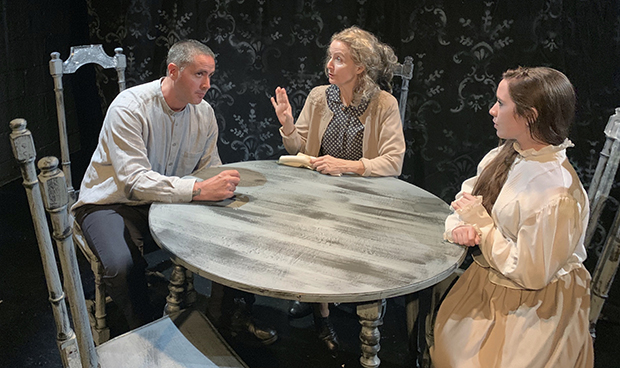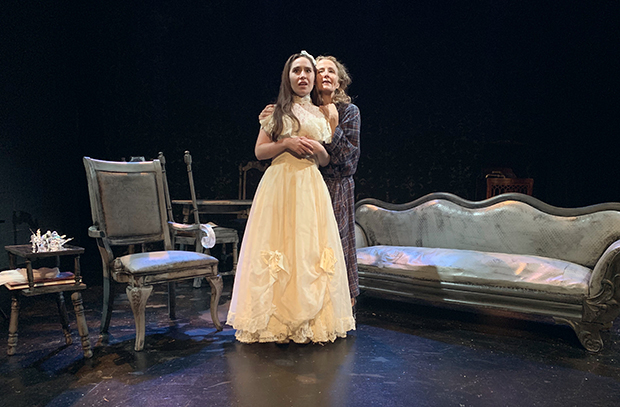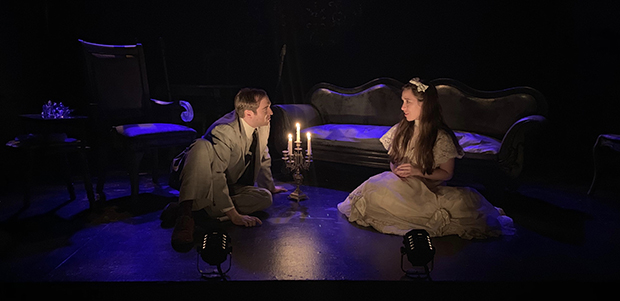The Glass Menagerie Is Haunting, but Is It Also Spooky?

(© Chris Loupos)
It could be argued that The Glass Menagerie, Tennessee Williams's memory play about intoxicating expectations and crushing disappointment, is always germane in this country besotted with dreams. Perhaps that is why there have been three Broadway revivals in the last 14 years. Or perhaps it is because these are great roles that every serious actor wants to have a crack at. The latter explanation seems likely in this off-off-Broadway revival produced by the year-old theater company Ruth Stage, and starring Matt de Rogatis in an unconventional take on the play's narrator, Tom Wingfield.
Often assumed to be an avatar for the playwright (born Thomas Lanier Williams), Tom advises us at the top of the play that it will be "dimly lighted," "sentimental," and "not realistic," as it derives entirely from his memories of the life he shared in a working-class St. Louis apartment with his mother, Amanda (Ginger Grace), and sister, Laura (Alexandra Rose). Like so many women in Williamsland, Amanda luxuriates in memories of Southern grandeur. Those days are now passed, relegating her to the fixed income of Tom's pay from the warehouse, which she supplements by selling magazine subscriptions over the telephone. Her husband left long ago, never to return.
But Amanda holds out hope that Laura will enjoy a prosperous future with a reliable husband. She needles Tom to bring home an ambitious young man for her to meet, and when he finally obliges, the whole family prepares for the arrival of this gentleman caller (Spencer Scott, with the oblivious optimism of a middle school guidance counselor). But Laura is withdrawn due to a childhood disability, more comfortable around her glass animal figurines than other people. When she learns that the gentleman caller is actually her high school crush, she practically turns to glass herself.
Rose delivers a painfully shy Laura, a woman who barely opens her mouth to speak. Every word carries a tremor portending tears, like thunder before a summer storm. Her limp is unnoticeable, suggesting that she is more emotionally "crippled" than anything. These are all strong choices, but Rose never moves beyond that initial mask, resulting in a flat performance that undermines the play's dynamism.

(© Chris Loupos)
Grace is far more surprising on that front. Rather than starting at 10 (as so many Amandas do), Grace sells Amanda as a pragmatist, a poor woman working to improve her family any way she can. Like a master chef, she slowly turns up the heat until we're boiling in her insanity without realizing how we got there, watching her outfit Laura for the fateful dinner in a wedding dress that only Miss Havisham could love — a self-fulfilling prophecy in tulle (costumes by Arlene's Costumes of Toms River, New Jersey).
De Rogatis delivers the most surprising performance of the evening: He eschews the typical portrayal of Tom as Tennessee, the cultivated writer reflecting on his disadvantaged youth. Instead, he goes full hillbilly (excellent work by dialect coach Paul Meier). With his defiant Appalachian speech pattern, he completely rejects his mother's social climbing (Amanda, we are briefly reminded, hails from East Tennessee, but you would never know from her Southern belle routine). Instead of reacting to Amanda like a cat that doesn't want to be petted, he finds humor in her antics, as any decent writer would when gifted with such a cornucopia of dysfunction. It's a smart angle on Tom, and one I've never seen before. Unfortunately, Tom's laughter all too often devolves into childish mockery, especially in his direct address to the audience.
A strong director might have guided de Rogatis through these tricky monologues. This production has two (Austin Pendleton and Peter Bloch) yet it feels oddly under-directed, with the performers delivering their own interpretations of the characters without a unifying vision. The basic living room set (by Jessie Bonaventure) and dim lighting (by Steve Wolf) are standard, like they could have come out of a Glass Menagerie starter kit. The only hint of a distinct perspective comes from Sean Hagerty's creepy music box underscoring and Jessie Wolfrom's scrim, which allows Laura to hide inside the wall for much of the show.

(© Chris Loupos)
This production has been informally branded "spooky Glass Menagerie," but this feels like a concept that never came to fruition. It only becomes fully apparent in Tom's final monologue, which de Rogatis delivers like a camp counselor invoking the name of Bloody Mary or the Slender Man. It's an intriguing idea that seems to emerge like a ghost from the wall after two hours of a solid but not particularly groundbreaking production. I'm not sure I'd sit through it again, but after de Rogatis's cliffhanger of a finale, I am looking forward to Glass 2: Laura's Revenge.











